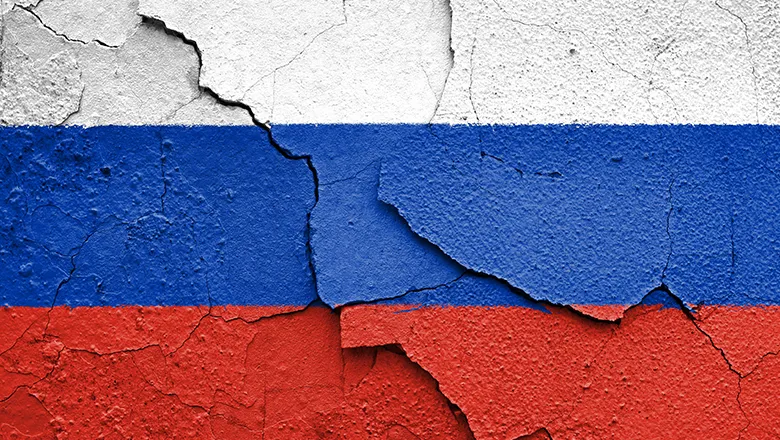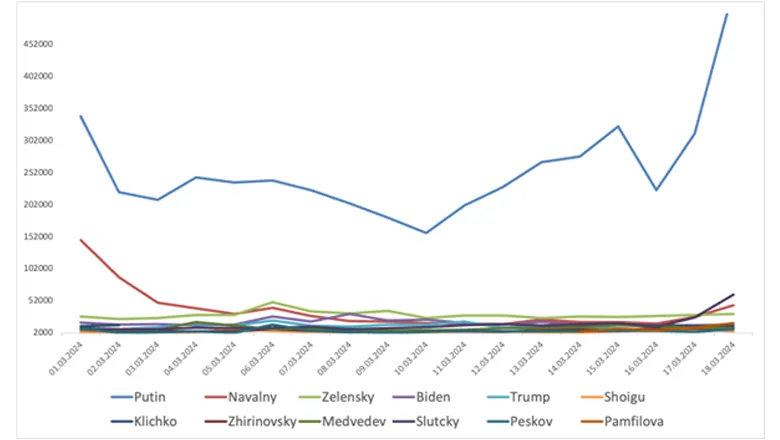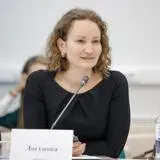The strategic emphasis on certain political figures and their narratives, coupled with the systematic sidelining of others, suggests an orchestrated effort to direct political dialogue. Notwithstanding this, the emergence of alternative voices on platforms like Telegram, and the increased prominence of opposition leaders such as Alexei Navalny, signal emerging fissures within this orchestrated media landscape, suggesting an undercurrent of dissent and the possibility of transformative change.
Dr Olga Logunova
27 March 2024
Social media analysis during presidential elections implies underlying Russian dissent
Social media activity around the Russian presidential elections shows the Kremlin tried to strongly control discussions, but the emergence of alternative voices reveals undercurrents of dissent to the official narrative.

As Russians went to the polls last week in the presidential elections, new analysis has indicated the Kremlin launched a highly-focused online campaign across the country’s social media channels to shape political discussions.
However, Dr Olga Logunova, of King’s Russia Institute has also found that the presence of alternative voices on platforms and the growing visibility of opposition figures such as Alexei Navalny reveal cracks in this controlled environment, hinting at underlying currents of dissent and the potential for change
After analysing Russia's online activity before, during, and after the election, Dr Logunova noted Vladimir Putin's remarkable performance, underscoring his consistent leadership. However, she also highlighted that the voice of the opposition, represented by Alexei Navalny, was noticeable and resonated on significant dates, indicating that despite efforts to overshadow dissenting opinions, there was a noticeable wave of activism challenging the mainstream narrative.
Dr Logunova collected data about the 50 most mentioned persons mainly from the BrandAnalytics website every day from 1st to 18th March which took into account 359,191,416 Russian-language social media messages.
She found that among the four principal candidates, only Vladimir Putin and Leonid Slytcky had a visible presence in social media discussions, which suggests a highly focused and possibly orchestrated online campaign. Notably, Putin's mentions were on average twenty times more frequent compared to those of Slytcky. This selective visibility contrasts sharply with the absence of the other two candidates from the top 50 popular social media figures, who garnered fewer than 2,000 mentions each per day, underscoring a narrow political conversation.

Vladimir Putin is undeniably the preeminent star of the internet realm, with his visibility soaring to more than 500,000 mentions per day on significant occasions, such as election results announcements or the annual address to the Federal Assembly — peaks that are challenging to surpass. However, on ordinary days, it becomes entirely feasible for others to approach his levels of visibility and gain more prominence in the digital space.
Dr Olga Logunova
Contrary to the general trend, Telegram channels showcased a different candidate, Vladislav Davankov, who, despite not featuring prominently in the broader social media landscape, carved out a niche on this specific platform. These findings demonstrate the disparity of mentions across different platforms, highlighting the polarisation of media consumption.
Dr. Logunova's analysis also revealed the influential role of non-competing figures like Ella Pamfilova, the chairwoman of the Central Election Commission. Her substantial number of mentions underscores the significance of election legitimacy, which was, in part, upheld through the chairwoman's assurances and public affirmations of the elections' integrity and transparency."
In addition, her findings indicated that other politicians like the late Vladimir Zhirinovsky, the former leader of the LDPR, continued to maintain a noteworthy presence in media discussions. The persistent mention of such figures adds nuance to the media discourse, reflecting a certain entrenched connection with the past political narratives that continue to resonate within the public domain.
Despite a tightly controlled media environment, there was also a noticeable increase in mentions of Alexei Navalny, on the day of the elections, particularly on March 17th, when his supporters announced their midday election activities. This surge in mentions, particularly in relation to his associates' initiatives, suggests that, even in the face of efforts to stifle opposition voices, there is a persistent undercurrent of activism that continues to challenge the official narrative.
Dr Logunova said: “This divergence suggests that alternative political voices find refuge in specific, perhaps less regulated, online spaces and offers a glimpse into the undercurrents of political dissent or alternative perspectives.
Dr Logunova is a Research Associate at King’s Russia Institute, King’s College London, whose work focuses on the intersection of sociology and media studies, emphasising social media communication, digital culture, and celebrity studies.

